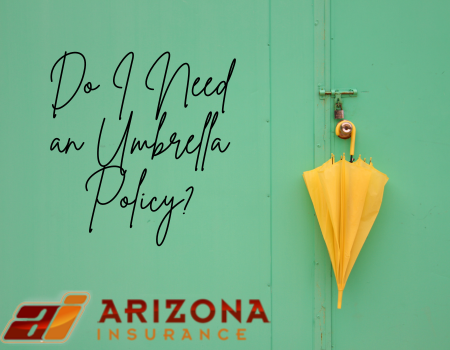Insurance is a critical component of financial planning and risk management. While most people have basic insurance coverage, such as auto and homeowners’ policies, there are situations where these standard policies may not provide sufficient protection, and it’s in such situations that you may need an umbrella policy. But, how do you know if you need an umbrella policy? Let’s explore what umbrella insurance is and the circumstances in which it may be a wise investment.
What is an Umbrella Policy?
An umbrella insurance policy, also known as excess liability insurance, is designed to provide additional liability coverage beyond the limits of your existing home, auto, or other insurance policies. It acts as a financial safety net, offering protection in case you are held legally responsible for a severe accident, injury, or property damage that exceeds the coverage limits of your primary insurance.
 Why You Might Need an Umbrella Policy:
Why You Might Need an Umbrella Policy:
- High Net Worth: If you have substantial assets, including valuable property, investments, or savings, you could be a target for lawsuits. In such cases, an umbrella policy can safeguard your wealth by providing extra liability coverage.
- Homeowners and Auto Insurance Limits: Your primary homeowners or auto insurance may have coverage limits that can be quickly exhausted in a lawsuit. Umbrella insurance offers an additional layer of protection beyond these limits.
- Rental Properties: If you own rental properties, you face a higher risk of liability claims, especially from tenants. Umbrella insurance can provide protection for potential lawsuits related to your rental properties.
- Pet Owners: If you own a pet, especially one with a reputation for aggression, you could be at risk of liability claims if your pet injures someone. An umbrella policy can provide extra coverage for such scenarios.
- Swimming Pools: If you have a swimming pool on your property, there is an increased risk of accidents. In case of a pool-related incident, umbrella insurance can help cover potential legal costs.
- Teenage Drivers: If you have teenage drivers in your household, the risk of accidents and claims may rise. An umbrella policy can provide added protection against lawsuits resulting from accidents involving your teenagers.
- Volunteer Work: Engaging in volunteer activities or serving on nonprofit boards can expose you to potential liability claims. Umbrella insurance can extend coverage to protect you while performing these volunteer duties.
- Social Hosting: If you frequently host social gatherings, parties, or events at your home, an umbrella policy can offer protection against accidents or injuries that occur on your property during these occasions.
- Libel and Slander: If you are accused of libel or slander, an umbrella policy can provide coverage for legal defense and potential settlements.
Determining Your Umbrella Insurance Needs:
To assess whether you need an umbrella policy and to determine the appropriate coverage amount, consider factors such as your assets, income, and personal circumstances. Think about the potential risks in your life, including those related to property, vehicles, and personal activities.
Additionally, it’s advisable to consult with an insurance professional or agent. They can help you evaluate your current insurance coverage and provide recommendations based on your specific needs and the risks you face.
In conclusion, whether or not you need an umbrella policy depends on your individual circumstances and financial situation. If you have substantial assets, engage in activities with potential liability risks, or face situations where your primary insurance may not provide adequate coverage, an umbrella policy can be a valuable addition to your insurance portfolio. It offers peace of mind and protection in the face of unforeseen and potentially costly events.
